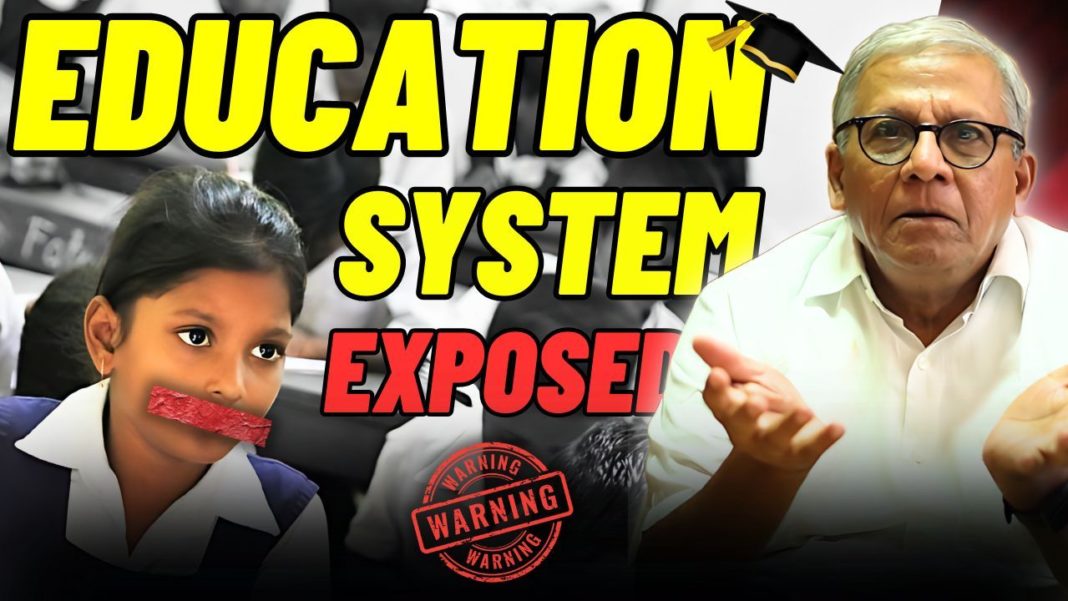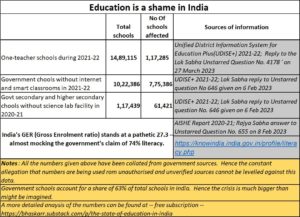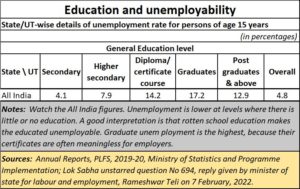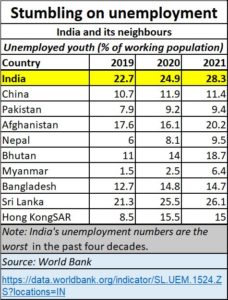Does India really care for education?
RN Bhaskar
This is an article about education. Medicare will be looked at later. Its immediate provocation is witnessing the constant chest-thumping claims of politicians – and occasionally even industrialists – that India’s march towards becoming a global power is certain. Inevitable.
But John Mearsheimer – one of the most reputed geopolitics experts in the world – recently stated that such thoughts are “aspirational” (timeline 2:27 at https://www.youtube.com/watch?v=AEwYCVJtKvs). He mentions that to be a superpower you need two key elements – people and enormous wealth. He said that India has people, but not great wealth.
This author believes that even when it comes to the number of people, this strength has been highly overrated.
The reasons are many and some of them can be found it my recent podcast at https://youtu.be/z3LyOnG_nEg?si=Jx53HYN4rKfG7iSy
India has actually worked towards degrading the quality of its manpower. This is the result not just of this government but even earlier governments.
It has not provided money for schoolteachers. This is evident from the fact that 117,286 government schools in the country had just one teacher. That teacher teaches all subjects, and all classes. This was admitted by the government before the Parliament on 27 March 2023.
Take another indicator. Out of the million schools that were surveyed, as many as 775,386 schools did not have internet connectivity and smart classrooms which would enable students to know more about the world, and allow teachers to teach them more about geography, species and even experiments. More schools began dabbling in history and ideological proselytising than in teaching math and science that actually matter.
The disregard for science is evident from the 61,721 schools of the 117,439 schools surveyed, which were without even laboratories. One wonders how these schools teach chemistry and physics. Is it with vessels sourced from kitchens?
ASER 2023 findings
The result is that the quality of students has degenerated. This is brought out quite eloquently by ASER’s reports.
ASER 2023 recorded that of the schools surveyed, only 45% of youth in the age group 14-18 has basic arithmetic proficiency. The rest needed to catch up for these basic skills (https://indianexpress.com/article/opinion/columns/aser-2023-report-on-education-lets-listen-to-the-teenagers-9116242/).
Low levels of foundational numeracy affect the ability of youth in tackling everyday calculations where they need to apply measurement or use the unitary method in practical situations, or even do simple financial computations such as managing a budget, applying a discount, or calculating repayment of a loan, states Rukmini Banerji, CEO, Pratham Education Foundation
The surveyors found that, as many as 26.4% of the youth in the same age group, cannot fluently read Class 2-level text in their mother tongue, with girls doing better than boys. Only a little over half (57%) can read sentences in English, of which three-quarters (73.5%) can tell their meanings. Only 43.3% of 14–18-year-olds were able to solve a three-digit by one-digit division problem correctly, a skill they were supposed to acquire by Classes 3 and 4. Males tend to do better in arithmetic and English reading than girls, according to the survey. https://www.freepressjournal.in/education/1-in-4-high-schoolers-cannot-read-half-cannot-do-maths-aser-2023-report
Sadly, these are the boys and girls who will flock to colleges for admission, and politicians will do everything they can to ensure that they get admission. With not-so-academically-inclined students rushing to colleges, it is no surprise that college and university education is also bad. It is just another variant of GIGO (garbage in – garbage out). It just needs a couple of students disturbing the teacher to ensure that nothing can be taught properly. One of the reasons why they disturb lectures is because they do not even understand what is being taught.
This eventually results in politicians bearing down on examiners through the Education Boards to ‘prop up’ the number of successful students. My considerable experience as an examiner has taught me that a student with as low as 15% marks can get propped up through several stages of ‘moderators’ so that he ends up with 35% (passing) marks.
Not surprisingly, the system has been creating more unemployables, than students who can be readily employed by potential employers. Businessmen complain about the lack of suitable manpower – that they do not get the candidates with the requisite skills that are useable.
Quite often, the government’s response to deal with this problem is to create rules for compulsory “sons of the soil” employment, or reservations for categories. That in turn frightens business away. It begins to seek safe havens where such reservations are not insisted upon. Businesses, eventually, need productivity so that the bottom-lines of their enterprises do not sag.
As a result, national unemployment figures are the worst in this region.
Unfortunately, politicians do not appear to be keen on improving the situation. Consider two instances which would be hilarious for any academician in developed countries. In India, most academicians do not dare protest too much, lest they lose their jobs.
First, consider the statement of the governor of the state of Maharashtra – often considered to be the most industrialised state and the financial capital of India. He said that schools must open later than they do currently. News reports record that “this is the need of the hour considering changed lifestyles. . . the GR [government resolution] points out inadequate sleep causing physical and mental health issues to children, due to late nights. (https://indianexpress.com/article/cities/mumbai/pre-primary-to-class-4-sessions-only-at-9-am-or-later-in-maharashtra-9152055/). The late nights are often because both parents and children watch TV at night, or attend or have parties that last long into the evening.
In most countries, parents would be advised to go to sleep early – not by politicians but by education advisers. They would point to the need for children to go to sleep early and wake up early. Clearly, the governor thought it prudent to get schools to start late instead of allowing educationists advise parents to enforce more lifestyle discipline.
Ironically, such pronouncements even go against the Hindu prescriptions that generally advise people to sleep early and wake up early.
But no legislator voiced his protest. Clearly comfort for adults was more important than education and discipline for children.
Take another instance. Instead of focussing on improving the quality of education for children, by measuring outcomes for each child periodically, the government decided to insist on unforms for teachers (https://www.youtube.com/watch?v=nSjPLPoXu2k).
Conclusion
John Mearsheimer was being charitable. He said that India had the people. But he did not talk about the consequences when populations are degraded in skills and perceptions (unemployability is confirmation of this), because of which they cease to be productive. The government is making more of these people into what Americans would call NINJAS (people without income, jobs, or assets).
India suffers from unemployment and little education. In addition to this there is poverty and the collapse of institutions (Free Subscription — https://open.substack.com/pub/bhaskarr/p/wrecking-institutions-and-norms?r=ni0hb&utm_campaign=post&utm_medium=web&showWelcomeOnShare=true). Such people are nothing but fodder for politicians who want them at rallies, or can instigate them to riot against someone or something. Not surprisingly, the states with the least educational proficiency and incomes are often those that register the highest number of incidents relating to communal strife and screaming gau rakshaks (cow protectors).
Political protests that disrupt meetings, tarnish speakers and teachers and humiliate authors and thinkers are becoming more commonplace in India.
Even wealth is being driven away – a matter that will be discussed shortly.
Clearly, India’s dreams of becoming superpower are at best aspirational. They could become a nightmare if remedial steps are not taken.








































COMMENTS